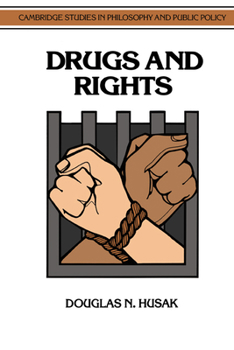Drugs and Rights
(Part of the Cambridge Studies in Philosophy and Public Policy Series)
Select Format
Select Condition 
Book Overview
This timely and important book is the first serious work of philosophy to address the question: Do adults have a moral right to use drugs for recreational purposes? Many critics of the war on drugs denounce law enforcement as counterproductive and ineffective. Douglas Husak argues that the war on drugs violates the moral rights of adults who want to use drugs for pleasure, and that criminal laws against such use are incompatible with moral rights...
Format:Paperback
Language:English
ISBN:0521427274
ISBN13:9780521427272
Release Date:July 1992
Publisher:Cambridge University Press
Length:324 Pages
Weight:1.00 lbs.
Dimensions:0.9" x 6.0" x 9.0"
Customer Reviews
3 ratings
Fantastic: a thorough analysis of Drugs and Rights
Published by Thriftbooks.com User , 16 years ago
Douglas Husak approaches the subject with an objective in-depth analysis of key points in the issue of drug decriminalization. He examines what drugs are and are not (for example how they are often impossible to categorize into 'recreational' vs 'medicinal') - he describes what sort of rights we have already and how drug prohibition is incompatible with those we already are granted by the legal system. Through empirical evidence, sound arguments, and hypothetical cases, Douglas Husak is very convincing in his conclusion that drug prohibition infringes on the moral rights; and law, needing a grounding in morality (as argued also in the book) is currently inconsistent and needs a change. This book, though written over a decade ago is still current in its arguments: because of Husak's approach to the subject. For slightly different arguments (and a simpler and shorter and cheaper read) consider Douglas Husak's "Legalize This!: The Case for Decriminalizing Drugs".
This is the most important book ever written about the War on Drugs
Published by Thriftbooks.com User , 17 years ago
This book examines the issue of whether the War on Drugs is morally permissible, and concludes that it is not. Many books written about the issue of whether the U.S. government should be waging war on drugs engage in an exercise of weighing the costs of the war on drugs against the benefits of the war on drugs. These usually involve either pointing out the unintended negative consequences of the war on drugs, or pointing out the ineffectiveness of the war on drugs, and/or the would-be costs of not having a war on drugs. While these issues are interesting, it is far more interesting to question whether the war on drugs is morally impermissible in the first place. This book does just that, and it argues that laws against recreational drugs are incompatible with moral principles that nearly all reasonable people agree with. In other words, the book argues that a government exceeds the moral limits of its authority when it incarcerates its people for merely using recreational drugs. In other words, let's say we were wondering what we thought about a total criminal prohibition of eating cheesecake. While we may well wonder whether a ban on cheesecake wouldn't be better for our collective health, and we might also wonder whether such a ban might actually prove impossible to enforce, or whether it might cause more problems than it solves, the primary issue is obviously whether a ban on cheesecake-eating is morally permissible in the first place. If it's morally wrong to incarcerate people for merely eating cheesecake, then the costs and benefits of laws against cheesecake hardly matter. For some mysterious reason, most thinkers about the war on drugs either completely overlook the issue of the moral impermissibility of criminal prohibitions of recreational drugs or give the issue short shrift, and even those not guilty of either do not treat the issue with the kind of philosophical sophistication and clarity involved in this book. This book addresses this primary issue of the moral permissibility of laws against recreational drugs, in a serious and sophisticated and clear manner, without pinning itself to any particular theory of government. This book is a serious work of philosophy, by a serious philosopher, that argues from moral principles and intuitions that most reasonable people share, but it is very accessible and clearly-written--no special training is required to understand the force of its arguments. At the time this book was written, Douglas Husak was a professor of philosophy at Rutgers University (widely considered to have a top 5 or top 10 philosophy program). He is now a law professor at University of Michigan School of Law (a top 5 or top 10 law school by all accounts). This is the most important book about the war on drugs that has ever been written. If you are wondering about the issue of the war on drugs, this is definitely where to start. If you are opposed to the drug war, you may better be able to put your finge
Glad I read Drug and Rights
Published by Thriftbooks.com User , 20 years ago
I used Husak's work to write a project for a logical reasoning undergrad class that claimed to prove deductively more than once over that Drugs should not be illegal in the U.S. The professor was pretty surprised it qualified as deductive. There are some novel principles Husak employs unlike arguments I've read in other books. His logical tests of what a drug that deserved to be illegal would have to look like are important. I was really pleased I decided to read this particular book on the subject, it was exactly what I was looking for as a critical thinker dubious of the War on Drugs and wondering whether or not the U.S. is totally off-base in its drug war. The book is clear, fair, is not a manifesto by any means but a critical look at the arguments for and against laws-against-drugs by a legal, philosophical thinker and university professor.





